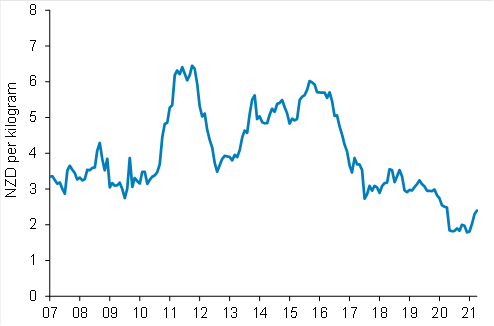NZ Business
Fair price for wool key to furniture giant’s ambitions

One of the country’s largest furniture and bedding retailers has committed to paying New Zealand farmers a fair price for their wool, as part of its efforts to make its business more sustainable.
In recent months, Napier-based Big Save Furniture has seen huge consumer demand for its range of locally-made furniture using New Zealand wool.
With wool prices so low – having fallen from more than $5/kg in 2017 to around $2/kg now - many sheep farmers are finding their earnings don’t even cover the cost of shearing their flock.
“The pricing we are seeing for wool simply isn’t sustainable, so we’ve decided to disrupt things a bit and commit to paying farmers $4.50/kg for their wool,” says Tom McKimm, Big Save Furniture’s Managing Director.
“We’re doing this so we have a long-term supply of wool we can rely on, but also to help look after our primary sector and an industry that produces a phenomenal product.”
“We all know that our farmers in the sector need improved returns, and that supports sustainable farming practices in the long run - so it's great to see this kind of innovation and investment going on.”
Lorraine Mapu, Managing Director of Business Banking at ANZ NZ Ltd.
Along with paying farmers fair prices for their wool, the company has invested further in the sector by recently buying four sheep and beef farms in the Ākitio, Hawkes Bay and Tararua regions.
“There’s no question they've got a real passion to get more dollars back to the farm gate,” says Lorraine Mapu, Managing Director of Business Banking at ANZ NZ, which finances the company.
“We all know that our farmers in the sector need improved returns, and that supports sustainable farming practises in the long run - so it's great to see this kind of innovation and investment going on.”

It is currently installing solar panels on five of its showrooms, with an ultimate goal of becoming 100 per cent sustainable.
Big Save is also seeing strong consumer interest in what materials are being used in its products, where they are being made, and where they will end up.
“Now, and especially since Covid, people want transparency - they want to know where a product is coming from and what will happen to it in 40 years’ time, when it ends up in a landfill,” says McKimm.
Wool’s natural qualities, including being fire retardant and hygienic, make it an ideal replacement for foam filling and padding in furniture.
It is also biodegradable, which means it is much easier and safer to dispose of at the end of its life.
The company is also exploring other uses for wool including the installation of tightly-woven mats as fire-retardant ceiling panels or using them as a non-toxic alternative to weed-killer, to stop grass from smothering native saplings.
“Every avenue you go to with wool, you just start to say, well, this is a no-brainer - why wasn't this being done before?” says McKimm.
“We want to ensure our products are both sustainable and genuinely good for the environment - it's not easy, but it can be done.”
Low Wool Prices
Since 2017 low returns for strong wool have plagued the wool industry, with most of New Zealand's strong wool used to manufacture carpets for European and US homes and commercial buildings.
Aside from the wool processed in New Zealand, most of the world's supply is processed in China, where tightening environmental rules have pushed up the cost of processing.
In addition to this, the demand for woollen floor coverings - which tend to be more expensive - never fully recovered in Europe after the Global Financial Crisis.
As a result of higher wool costs, carpet producers have tended to alter the blends of their mixed synthetic and natural materials to use less wool, further decreasing demand.
Wool prices in NZD per kilogram

Sources: Wool Services International, PGG Wrightson, ANZ Research
RELATED ARTICLES
NZ Business
Young Farmer finalist grabs Ashburton banking role 'with both hands'
NZ Business